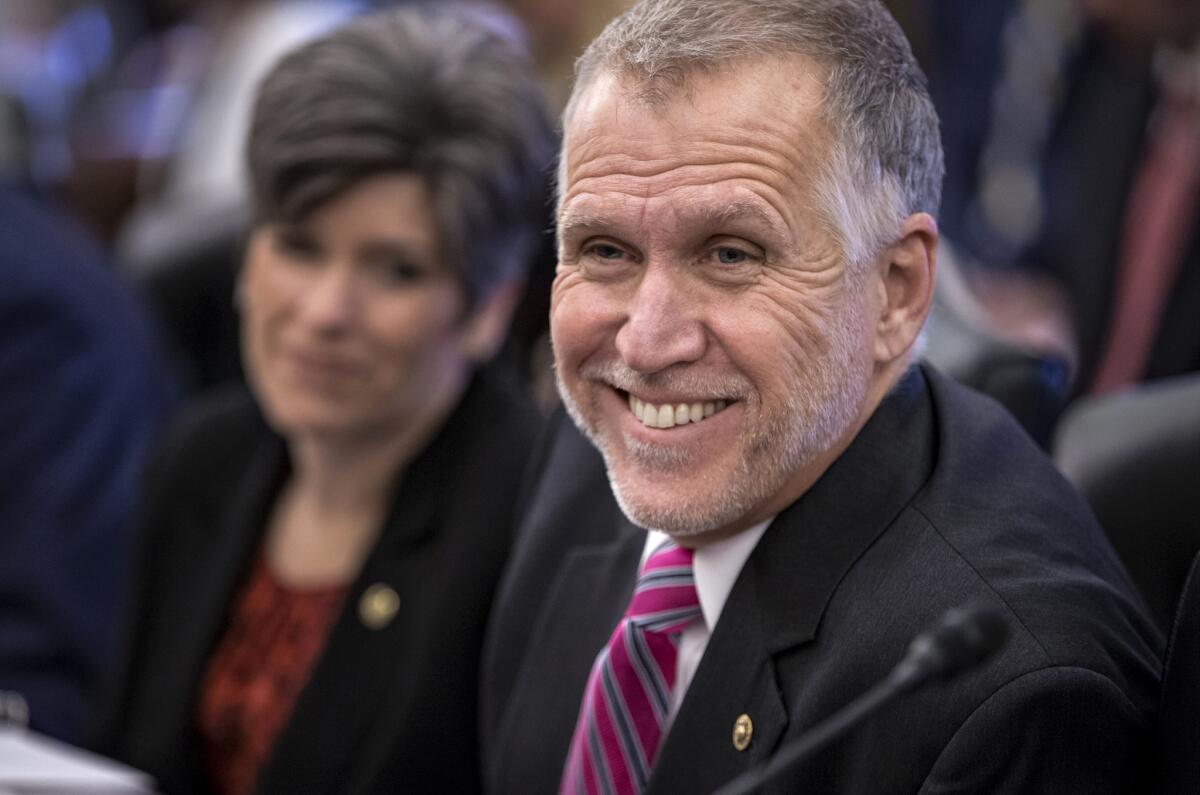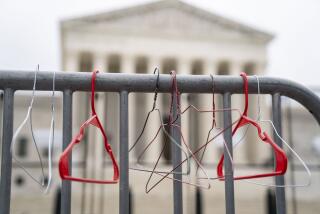Opinion: Saving time, Judiciary Republicans reject Obama nominee in advance

Sen. Thom Tillis (R-N.C.), shown in Washington last month, was one of 11 Republicans on the Senate Judiciary Committee pledging not to hold a hearing on any Supreme Court nominee Obama sends their way.
On second thought, maybe it’s okay to be obstructionist after all.
Last week, Sen. Thom Tillis (R-N.C.) warned his Republican colleagues not to reject a Supreme Court nominee from President Obama sight unseen lest they “fall into the trap of being obstructionist.” On Tuesday, Tillis joined all 10 of the other Republicans on the Senate Judiciary Committee in pledging “to exercise our constitutional authority to withhold consent on any nominee to the Supreme Court submitted by this President” to fill the vacancy left by the recent demise of Justice Antonin Scalia.
The pledge — written in a letter to Senate Majority Leader Mitch McConnell — goes on to state that the committee “will not hold hearings on any Supreme Court nominee until after our next President is sworn in on Jan. 20, 2017.”
It’s not at all surprising that Republicans would rather wait to see what happens in the election than let a Democrat fill Scalia’s seat now — and presumably shift the court’s majority from conservative to liberal. It’s just puzzling that they would do it this way, leaping headfirst into the very trap that Tillis noted just a few days ago.
It’s not surprising that Republicans would rather wait to see what happens in the election than let Obama fill Scalia’s seat. It’s just puzzling that they would do it this way.
Now, I don’t buy for a moment the argument some Democrats make that the Senate has an obligation to approve any nominee who’s clearly qualified for the job. And despite what Obama has argued, the Constitution doesn’t even oblige the Senate to consider the nominee he puts forward. Instead, it gives the Senate absolute veto power over the president’s choice.
But if this crazy primary season demonstrates anything, it’s that voters are fed up with Washington and politics as usual. And for the last five years, “politics as usual” has meant partisan head-butting and recalcitrance, dysfunction and paralysis.
So now a cadre of Republicans say they are preemptively slamming the brakes on the advice-and-consent process, threatening to leave the Supreme Court shorthanded well into its 2016-2017 term. With the remaining eight justices evenly divided on a host of important legal issues, the freeze in Congress could translate into a bevy of 4-4 deadlocks.
The Judiciary Committee Republicans said they were motivated by a desire “to ensure the American people are not deprived of the opportunity to engage in a full and robust debate over the type of jurist they wish to decide some of the most critical issues of our time.” This is, of course, claptrap. Republicans don’t want the presidential election to be a debate over the next Supreme Court nominee. They want it to be a debate over either Hillary Clinton’s private email server and her questionable truthiness or Bernie Sanders’ free-market-hating, economy-destroying socialism. Such a focus, they believe, will guarantee that the next Supreme Court justice will be picked by one of their own.
And it’s transparently claptrap. The political considerations on both sides are unmistakable. So why did the lawmakers tip their hands this way? Why not simply slow-roll the process? Hold off a hearing for several months, then use that session to try to undermine the nominee — as the Democrats did to Robert Bork? Evidently, they believed they had more to gain by playing to the conservatives who care deeply about the direction of the court than they’d lose by alienating the independents who are tired of Washington gamesmanship.
A more honest explanation came from Sen. Lindsey Graham (R-S.C.), erstwhile presidential candidate and a Judiciary subcommittee chairman. The Daily Beast quoted Graham saying Tuesday, “If they [Democrats] were in charge they’d be doing the exact same thing, so this is going to go to the American people.... I’m not going to meet with the nominee.”
And yes, one can find Democrats posturing in similar ways in past election years, although not when confronted with an actual Supreme Court vacancy. One example is Obama’s vice president, Joe Biden, who as chairman of the Senate Judiciary Committee in 1992 said the Senate shouldn’t consider a Supreme Court nominee in the throes of campaign season.
But again, that’s just politics as usual -- finger-pointing and “They did it first” accusations. And if that sort of thing played well with the public, more establishment figures like Graham would still be in the race.
Obama could bail the Republicans out by striking a deal with McConnell that would allow the president to make a recess appointment to the court. That justice would serve until the end of 2017 unless the Senate confirmed him or her next year. And because McConnell controls whether the Senate ever goes into recess, he could prevent Obama from putting anyone on the court even temporarily who was not acceptable to Senate Republicans.
Such a move would reduce the potency of the “obstructionist” argument, but it’s hard to see any incentive for Obama to go that route. Rather than making a recess appointment, expect him to nominate someone with impeccable credentials who’s been supported by Republicans and Democrats alike in the past. And then expect him to use some variation of the word “obstructionist” just about every time he faces a microphone.
Follow Healey’s intermittent Twitter feed: @jcahealey
More to Read
A cure for the common opinion
Get thought-provoking perspectives with our weekly newsletter.
You may occasionally receive promotional content from the Los Angeles Times.







